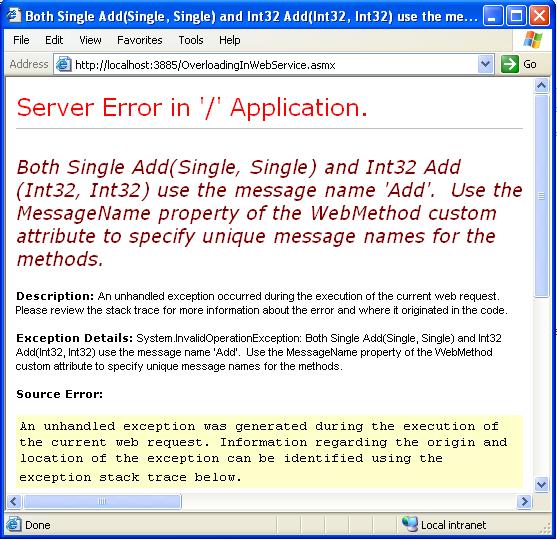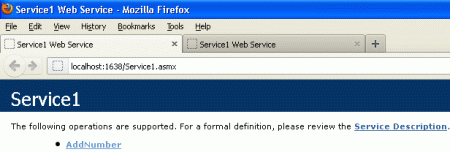Overloading Web Services
While trying to overload Web Methods in Web Services and after doing
the build, it will work successfully. But when we try to run or consume,
it will show an error message. We can show this using an example.
 Collapse | Copy Code
Collapse | Copy Code
namespace TestOverloadingWebService
{
[WebService(Namespace = "http://tempuri.org/", Description=" <b> Function
overloading in Web Services </b>")]
public class OverloadingInWebService : System.Web.Services.WebService
{
[WebMethod()]
public int Add(int a, int b)
{
return (a + b);
}
[WebMethod()]
public float Add(float a, float b)
{
return (a + b);
}
}
}
In the above example, we made one web service having class
OverloadingInWebService. In the Web Service, we have added attribute
Description, which is used to describe the web service purpose to client. In the above Web Service, we have two overloaded
WebMethods:
 Collapse | Copy Code
Collapse | Copy Code
public int Add(int a, int b)
and
 Collapse | Copy Code
Collapse | Copy Code
public float Add(float a, float b)
While running this Web service, it will show the following runtime error.

Solution for the Above Error
The procedure to solve this problem is very easy. Start each method with a Web Method attribute. Add
Description property to add a description of web method and
MessageName property to change web method name.
 Collapse | Copy Code
Collapse | Copy Code
[WebMethod(MessageName = "<name>", Description = "<description>")]
 Collapse | Copy Code
Collapse | Copy Code
namespace TestOverloadingWebService
{
[WebService(Namespace = "http://tempuri.org/", Description=" <b> Function
overloading in Web Services </b>")]
public class OverloadingInWebService : System.Web.Services.WebService
{
[WebMethod(MessageName = "AddInt", Description = "Add two integer
Value", EnableSession = true)]
public int Add(int a, int b)
{
return (a + b);
}
[WebMethod(MessageName = "AddFloat", Description = "Add two Float
Value", EnableSession = true)]
public float Add(float a, float b)
{
return (a + b);
}
}
}
Reason for the Above Error
The Overloading is supported by web services. But when WSDL (Web
Service Description Language) is generated, it will not be able to make
the difference between methods because WSDL does not deal on the base of
parameters. By passing web methods –‘
MessageName Property’, it changes the method name in WSDL. See the WSDL given below, the operation name is
Add but the input method name is
AddInt as well as output method name is also same (
AddInt). The same will apply for Float also.
 Collapse | Copy Code
Collapse | Copy Code
<wsdl:operation name="Add">
<wsdl:documentation xmlns:wsdl="http://schemas.xmlsoap.org/wsdl/">Add
two integer Value</wsdl:documentation>
<wsdl:input name="AddInt" message="tns:AddIntSoapIn" />
<wsdl:output name="AddInt" message="tns:AddIntSoapOut" />
</wsdl:operation>
<wsdl:operation name="Add">
<wsdl:documentation xmlns:wsdl="http://schemas.xmlsoap.org/wsdl/">Add
two Float Value</wsdl:documentation>
<wsdl:input name="AddFloat" message="tns:AddFloatSoapIn" />
<wsdl:output name="AddFloat" message="tns:AddFloatSoapOut" />
</wsdl:operation>
Other Example
Creating XML Web Service in .Net
Use the following steps to create a web service.
- Go to Visual Studio 2010 and create a New Project.

- Select .NET Framework 3.5.
- Create an ASP.NET Web Service Application.
- Give it a name and click ok button.

Add the following method in the Service.cs file.
[WebMethod]
public int AddNumber(int a, int b)
{
return (a + b);
}
[WebMethod]
public int AddNumber(int a, int b, int c)
{
return (a + b + c);
}
The complete Service.cs file is:
using System;using System.Collections.Generic;using System.Linq;using System.Web;using System.Web.Services;namespace WebMethodOverlodding
{
/// <summary> /// Summary description for Service1 /// </summary> [WebService(Namespace = "http://tempuri.org/")]
[WebServiceBinding(ConformsTo = WsiProfiles.BasicProfile1_1)]
[System.ComponentModel.ToolboxItem(false)]
// To allow this Web Service to be called from script, using ASP.NET AJAX, uncomment the following line. // [System.Web.Script.Services.ScriptService] public class Service1 : System.Web.Services.WebService {
[WebMethod]
public int AddNumber(int a, int b)
{
return (a + b);
}
[WebMethod]
public int AddNumber(int a, int b, int c)
{
return (a + b + c);
}
}
}
In
the above Web Service, we have two overloaded WebMethods. This Web
Service would compile fine. Run the WebService in the browser. That
should give an error saying that the AddNumbers() methods use the same
message name 'AddNumbers' and asking to use the MessageName property of
the WebMethod. like as.
Solution for the Above Error
The
procedure to solve this problem is very easy. Start each method with a
Web Method attribute. Add the MessageName property to the WebMethod
attribute as shown below.
[WebMethod]
public int AddNumber(int a, int b)
{
return (a + b);
}
[WebMethod (MessageName="AddThreeNumbers")]
public int AddNumber(int a, int b, int c)
{
return (a + b + c);
}
The complete Service.cs file is look like as.
using System;using System.Collections.Generic;using System.Linq;using System.Web;using System.Web.Services;namespace WebMethodOverlodding
{
/// <summary> /// Summary description for Service1 /// </summary> [WebService(Namespace = "http://tempuri.org/")]
[WebServiceBinding(ConformsTo = WsiProfiles.BasicProfile1_1)]
[System.ComponentModel.ToolboxItem(false)]
// To allow this Web Service to be called from script, using ASP.NET AJAX, uncomment the following line. // [System.Web.Script.Services.ScriptService] public class Service1 : System.Web.Services.WebService {
[WebMethod]
public int AddNumber(int a, int b)
{
return (a + b);
}
[WebMethod (MessageName="AddThreeNumbers")]
public int AddNumber(int a, int b, int c)
{
return (a + b + c);
}
}
}
Now again run the above web service by pressing the F5 key; we will then see:

Reason for the Above Error
The
Overloading is supported by web services. But when WSDL (Web Service
Description Language) is generated, it will not be able to make the
difference between methods because WSDL does not deal on the base of
parameters. By passing web methods 'MessageName Property', it changes
the method name in WSDL. See the WSDL given below, the operation name is
AddNumber but the input method name and output method name is different. The same will apply for second method also.
<wsdl:operation name="AddNumber">
<wsdl:input message="tns:AddNumberSoapIn"/>
<wsdl:output message="tns:AddNumberSoapOut"/>
</wsdl:operation>
<wsdl:operation name="AddNumber">
<wsdl:input name="AddThreeNumbers" message="tns:AddThreeNumbersSoapIn"/>
<wsdl:output name="AddThreeNumbers" message="tns:AddThreeNumbersSoapOut"/>
</wsdl:operation>


 Solution for the Above Error
The
procedure to solve this problem is very easy. Start each method with a
Web Method attribute. Add the MessageName property to the WebMethod
attribute as shown below.
[WebMethod]
public int AddNumber(int a, int b)
{
return (a + b);
}
[WebMethod (MessageName="AddThreeNumbers")]
public int AddNumber(int a, int b, int c)
{
return (a + b + c);
}
The complete Service.cs file is look like as.
using System;using System.Collections.Generic;using System.Linq;using System.Web;using System.Web.Services;namespace WebMethodOverlodding
{
/// <summary> /// Summary description for Service1 /// </summary> [WebService(Namespace = "http://tempuri.org/")]
[WebServiceBinding(ConformsTo = WsiProfiles.BasicProfile1_1)]
[System.ComponentModel.ToolboxItem(false)]
// To allow this Web Service to be called from script, using ASP.NET AJAX, uncomment the following line. // [System.Web.Script.Services.ScriptService] public class Service1 : System.Web.Services.WebService {
[WebMethod]
public int AddNumber(int a, int b)
{
return (a + b);
}
[WebMethod (MessageName="AddThreeNumbers")]
public int AddNumber(int a, int b, int c)
{
return (a + b + c);
}
}
}
Now again run the above web service by pressing the F5 key; we will then see:
Solution for the Above Error
The
procedure to solve this problem is very easy. Start each method with a
Web Method attribute. Add the MessageName property to the WebMethod
attribute as shown below.
[WebMethod]
public int AddNumber(int a, int b)
{
return (a + b);
}
[WebMethod (MessageName="AddThreeNumbers")]
public int AddNumber(int a, int b, int c)
{
return (a + b + c);
}
The complete Service.cs file is look like as.
using System;using System.Collections.Generic;using System.Linq;using System.Web;using System.Web.Services;namespace WebMethodOverlodding
{
/// <summary> /// Summary description for Service1 /// </summary> [WebService(Namespace = "http://tempuri.org/")]
[WebServiceBinding(ConformsTo = WsiProfiles.BasicProfile1_1)]
[System.ComponentModel.ToolboxItem(false)]
// To allow this Web Service to be called from script, using ASP.NET AJAX, uncomment the following line. // [System.Web.Script.Services.ScriptService] public class Service1 : System.Web.Services.WebService {
[WebMethod]
public int AddNumber(int a, int b)
{
return (a + b);
}
[WebMethod (MessageName="AddThreeNumbers")]
public int AddNumber(int a, int b, int c)
{
return (a + b + c);
}
}
}
Now again run the above web service by pressing the F5 key; we will then see:

 Reason for the Above Error
The
Overloading is supported by web services. But when WSDL (Web Service
Description Language) is generated, it will not be able to make the
difference between methods because WSDL does not deal on the base of
parameters. By passing web methods 'MessageName Property', it changes
the method name in WSDL. See the WSDL given below, the operation name is
AddNumber but the input method name and output method name is different. The same will apply for second method also.
<wsdl:operation name="AddNumber">
<wsdl:input message="tns:AddNumberSoapIn"/>
<wsdl:output message="tns:AddNumberSoapOut"/>
</wsdl:operation>
<wsdl:operation name="AddNumber">
<wsdl:input name="AddThreeNumbers" message="tns:AddThreeNumbersSoapIn"/>
<wsdl:output name="AddThreeNumbers" message="tns:AddThreeNumbersSoapOut"/>
</wsdl:operation>
Reason for the Above Error
The
Overloading is supported by web services. But when WSDL (Web Service
Description Language) is generated, it will not be able to make the
difference between methods because WSDL does not deal on the base of
parameters. By passing web methods 'MessageName Property', it changes
the method name in WSDL. See the WSDL given below, the operation name is
AddNumber but the input method name and output method name is different. The same will apply for second method also.
<wsdl:operation name="AddNumber">
<wsdl:input message="tns:AddNumberSoapIn"/>
<wsdl:output message="tns:AddNumberSoapOut"/>
</wsdl:operation>
<wsdl:operation name="AddNumber">
<wsdl:input name="AddThreeNumbers" message="tns:AddThreeNumbersSoapIn"/>
<wsdl:output name="AddThreeNumbers" message="tns:AddThreeNumbersSoapOut"/>
</wsdl:operation>
No comments:
Post a Comment